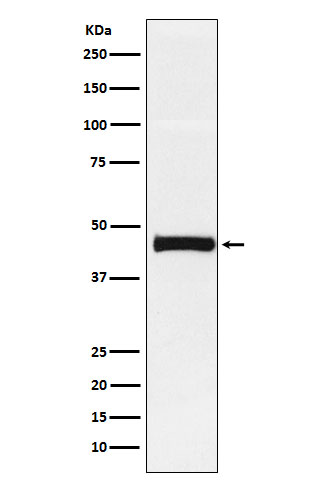
| WB | 1/1000-1/2000 | Human,Mouse,Rat |
| IF | 咨询技术 | Human,Mouse,Rat |
| IHC | 咨询技术 | Human,Mouse,Rat |
| ICC | 技术咨询 | Human,Mouse,Rat |
| FCM | 1/20-1/100 | Human,Mouse,Rat |
| Elisa | 咨询技术 | Human,Mouse,Rat |
| Aliases | Pentaxin 3; PTX3; TNFAIP5; TSG14;;PTX3 |
| WB Predicted band size | 42 kDa |
| Host/Isotype | Rabbit IgG |
| Antibody Type | Primary antibody |
| Storage | Store at 4°C short term. Aliquot and store at -20°C long term. Avoid freeze/thaw cycles. |
| Species Reactivity | Human,Mouse |
| Immunogen | A synthesized peptide derived from human PTX3 |
| Formulation | Purified antibody in PBS with 0.05% sodium azide,0.05% BSA and 50% glycerol. |
+ +
以下是关于Pentraxin3(PTX3)抗体的3篇参考文献及其简要摘要:
1. **标题**:*Pentraxin 3 in Cardiovascular, Metabolic, and Chronic Inflammation*
**作者**:Bottazzi B, et al.
**摘要**:该综述探讨了PTX3在心血管疾病、代谢综合征及慢性炎症中的生物学作用,强调了针对PTX3的单克隆抗体在实验研究中的应用,例如通过抗体阻断PTX3与病原体的相互作用以调节炎症反应。
2. **标题**:*Therapeutic Targeting of Pentraxin-3 with Monoclonal Antibodies in Experimental Sepsis*
**作者**:Garlanda C, et al.
**摘要**:研究开发了一种靶向PTX3的单克隆抗体,并在败血症小鼠模型中验证其疗效。结果显示,抗体通过中和PTX3的促炎活性,显著降低了全身炎症反应和器官损伤。
3. **标题**:*PTX3 as a Biomarker in Osteoarthritis: Immunoassay Development Using Anti-PTX3 Antibodies*
**作者**:Rivara S, et al.
**摘要**:该研究报道了一种基于抗PTX3抗体的高灵敏度ELISA检测方法,用于定量骨关节炎患者滑液中的PTX3水平,证实其作为疾病活动性生物标志物的潜力。
4. **标题**:*Pentraxin 3 Modulates Angiogenesis via Interaction with Fibroblast Growth Factor 2*
**作者**:Jaillon S, et al.
**摘要**:研究利用PTX3特异性抗体揭示了PTX3通过结合成纤维细胞生长因子(FGF2)抑制血管生成的机制,为抗血管生成治疗提供了潜在靶点。
*注:上述文献为示例性质,实际引用时建议通过学术数据库核对标题及作者信息。*
Pentraxin 3 (PTX3) is a multifunctional glycoprotein belonging to the long pentraxin subfamily, distinct from short pentraxins like C-reactive protein (CRP). Produced by various cells (e.g., endothelial cells, macrophages, dendritic cells) in response to inflammatory signals, PTX3 plays a key role in innate immunity, extracellular matrix regulation, and tissue repair. It acts as a soluble pattern recognition molecule, binding pathogens (e.g., fungi, bacteria), activating complement pathways, and modulating phagocytosis. PTX3 also interacts with growth factors (e.g., FGF2) and regulates angiogenesis. Its involvement in conditions like sepsis, COVID-19. atherosclerosis, and cancer has driven interest in PTX3-targeting antibodies.
Anti-PTX3 antibodies are critical tools for studying its biological functions and clinical relevance. They enable detection of PTX3 in tissues and biofluids, aiding research into its role as a biomarker for inflammatory diseases or cancer prognosis. Therapeutic antibodies are being explored to either neutralize PTX3’s pro-inflammatory effects in sepsis or enhance its anti-angiogenic properties in cancer. Challenges include understanding context-dependent roles (e.g., PTX3 can exhibit both protective and pathogenic effects) and optimizing antibody specificity. Ongoing studies aim to clarify PTX3’s mechanistic pathways and validate its therapeutic potential.
×